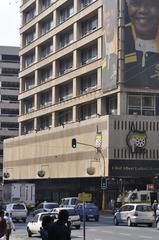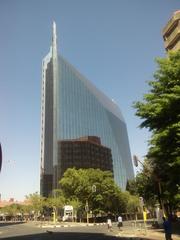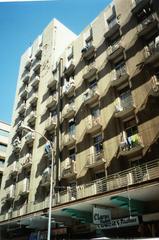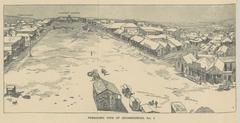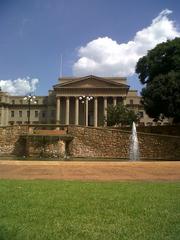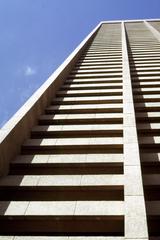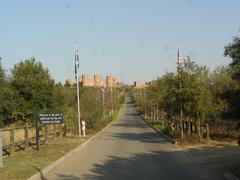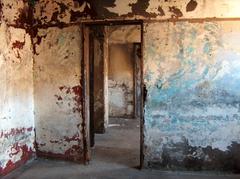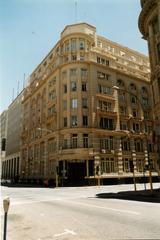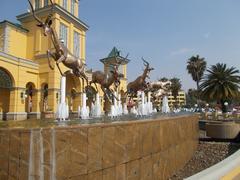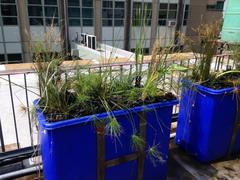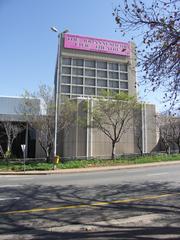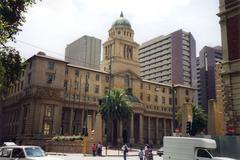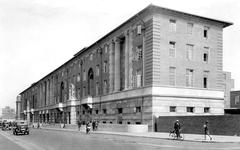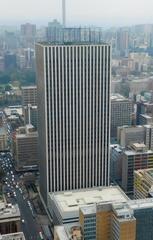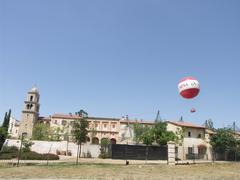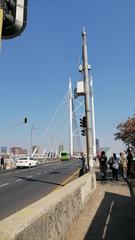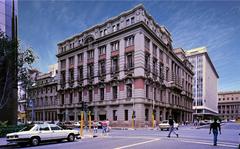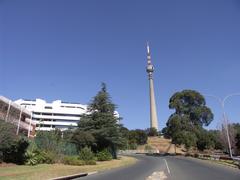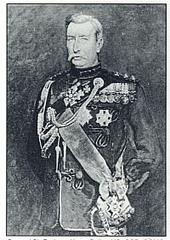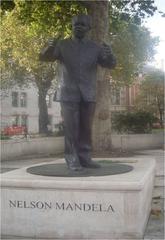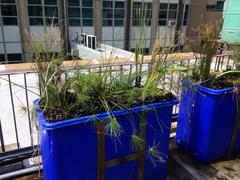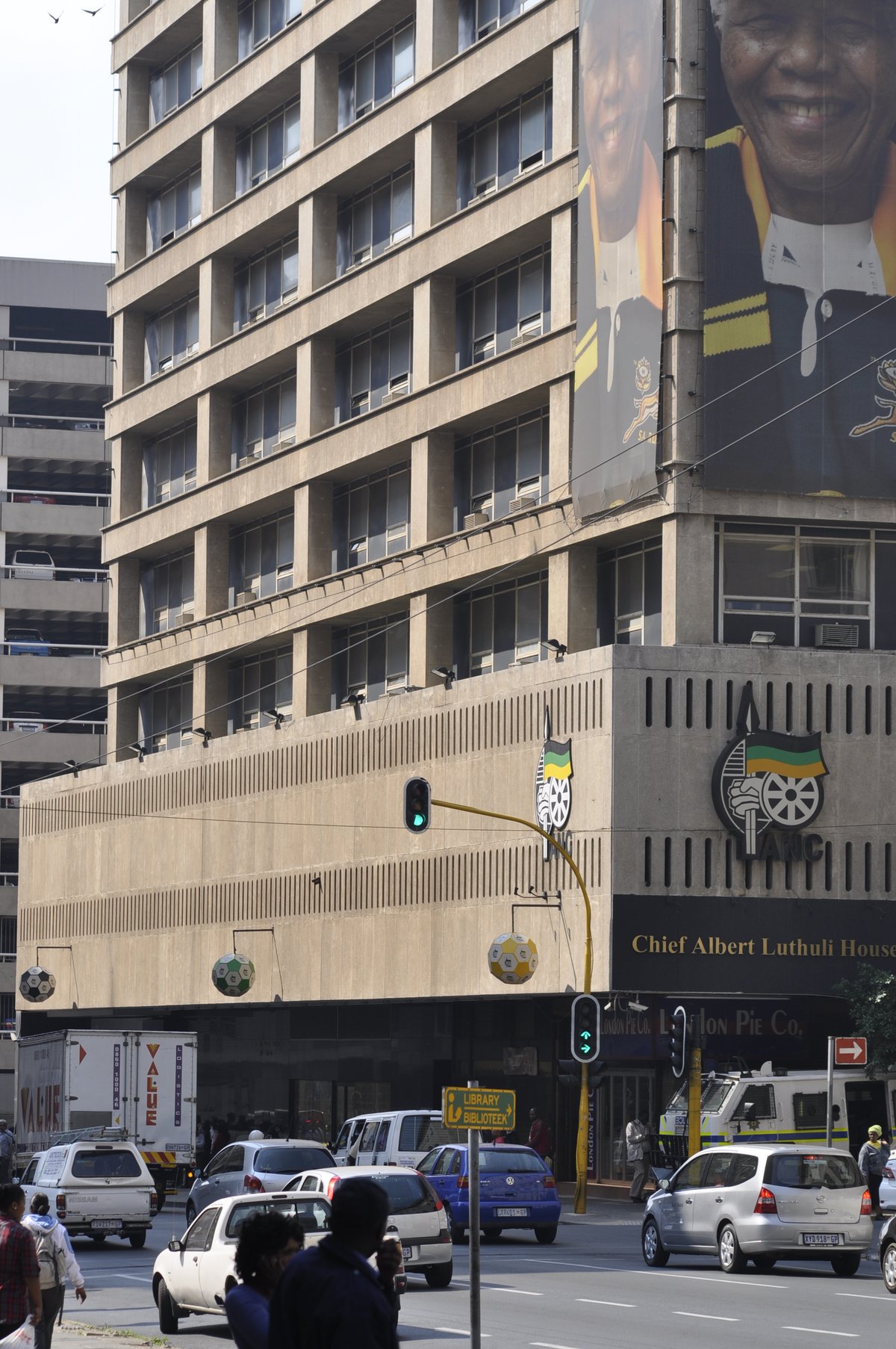
Luthuli House Visiting Hours, Tickets, and Guide to Johannesburg Historical Sites
Date: 14/06/2025
Introduction
Luthuli House, the headquarters of the African National Congress (ANC), stands at 54 Sauer Street in Johannesburg’s central business district. Far more than an administrative hub, Luthuli House symbolizes South Africa’s enduring struggle for democracy and justice. Named after Chief Albert John Mvumbi Luthuli—the first African Nobel Peace Prize laureate and an icon of non-violent resistance—this building remains a focal point for political discourse, commemorations, and the country’s ongoing democratic journey (ANC History; SA History: Luthuli Timeline). While not a conventional tourist attraction, Luthuli House offers visitors, scholars, and those interested in South Africa’s liberation history a unique vantage point into the nation’s past and present.
This detailed guide provides essential information including Luthuli House’s historical significance, practical visiting details, accessibility, and tips for exploring Johannesburg’s most important political and cultural landmarks.
Table of Contents
- Historical Background
- Visiting Luthuli House
- Luthuli House in Context: Architecture and Urban Setting
- Legacy and Symbolism
- Nearby Historical Sites and Attractions
- Frequently Asked Questions
- Conclusion and Visitor Tips
- Call to Action
- Sources
Historical Background
Origins and Naming
Luthuli House is a 22-floor high-rise, originally known as Shell House until the ANC’s purchase in 1993. It was renamed in 1998 to honor Chief Albert Luthuli, reflecting the organization’s commitment to non-racialism, democracy, and human rights (ANC History). The building has played a central role in South Africa’s political history, especially following the unbanning of the ANC in 1990.
About Chief Albert Luthuli
Chief Albert Luthuli (1898–1967) was a Zulu chief, teacher, and president of the ANC from 1952 to 1967. A key figure in the anti-apartheid movement, Luthuli was awarded the Nobel Peace Prize in 1961 for his leadership in non-violent resistance, particularly during the Defiance Campaign and the adoption of the Freedom Charter (SA History: Luthuli Timeline).
ANC’s Role and the Shell House Massacre
Luthuli House has been the nerve center for ANC operations, especially during the pivotal transition to democracy in the early 1990s and South Africa’s first democratic elections. The building’s history includes events like the Shell House Massacre in March 1994, when security guards fired on protestors, highlighting tensions during the lead-up to the end of apartheid (ANC Fandom: Luthuli House).
Visiting Luthuli House
Hours, Access, and Tickets
Luthuli House is not a public museum and does not offer regular tours or public entry. Visits are strictly by appointment, generally reserved for official business, educational groups, or media. There is no ticketing system or admission fee.
Location and Accessibility
Located at 54 Sauer Street, Luthuli House is easily accessible by public transport, including the Rea Vaya bus system and Johannesburg Park Station. Taxis and ride-hailing services are recommended, especially for first-time visitors (South African History Online; Rough Guides). The building is wheelchair accessible, though surrounding city sidewalks may be uneven.
Safety and Travel Tips
- Visit during business hours (Monday–Friday, 8:00 AM to 5:00 PM) for safety and vibrancy.
- Always check ahead for security protocols and required permissions.
- Dress modestly and behave respectfully due to the site’s political significance.
- Remain vigilant in the CBD; travel in groups and secure valuables.
- Consider hiring a local guide for walking tours and deeper context (Rough Guides).
Special Events and Commemorations
Luthuli House often hosts political rallies, press conferences, and commemorative events, especially on significant dates like Human Rights Day and Freedom Day. Monitor the ANC’s official website and social media for event schedules.
Luthuli House in Context: Architecture and Urban Setting
Luthuli House is a functional office tower, housing the ANC headquarters and key administrative offices (Wikipedia). Its location in the CBD places it near historical and civic landmarks, reflecting Johannesburg’s political and economic dynamism. The building’s public exterior is often a focal point for protests and political activity (Kenyans.co.ke).
Legacy and Symbolism
Named for Chief Albert Luthuli, the building embodies ideals of non-racialism, human rights, and the ongoing quest for democracy. It serves as a living monument to the sacrifices of countless activists and continues to be a stage for political engagement in post-apartheid South Africa (ANC Manifesto).
Nearby Historical Sites and Attractions
Enhance your visit to Luthuli House by exploring these nearby landmarks:
- Constitution Hill: Former prison complex and current Constitutional Court, with exhibits on South Africa’s democratic journey.
- Apartheid Museum: Comprehensive museum documenting apartheid and resistance (Rough Guides).
- Chancellor House: The law office of Nelson Mandela and Oliver Tambo, now a heritage site (Never Ending Footsteps).
- Mandela Family Museum (Soweto): Offers insight into Nelson Mandela’s life.
- Luthuli Museum (Groutville, KwaZulu-Natal): Dedicated to Chief Albert Luthuli’s legacy (Luthuli Museum).
- Beyers Naudé Square, Johannesburg City Library, and Maboneng Precinct: Cultural and historic hubs near Luthuli House (Mapcarta).
Frequently Asked Questions (FAQ)
Can I tour Luthuli House?
General public tours are not offered. Visits are by appointment for official or educational purposes.
What are the visiting hours?
The building operates during standard office hours (Monday–Friday, 8:00 AM–5:00 PM).
Is there an admission fee?
No, but entry is by prior arrangement only.
Are guided tours available?
Not regularly. Some group or educational tours may be arranged through the ANC.
What else should I see nearby?
Constitution Hill, Apartheid Museum, Chancellor House, and the Mandela Family Museum are all recommended.
Is photography allowed?
Photography of the exterior from public spaces is generally permitted. Avoid photographing security personnel or sensitive areas without permission.
Conclusion and Visitor Tips
Luthuli House is a profound symbol of South Africa’s political legacy and its ongoing quest for democracy. While public access is limited, the building’s exterior and its location in the vibrant heart of Johannesburg allow visitors to experience the pulse of the nation’s history. Combine your visit with nearby heritage sites to gain a fuller understanding of South Africa’s liberation journey and contemporary political landscape.
Stay informed of upcoming ANC events and commemorations for unique opportunities to witness political engagement firsthand. For safety and convenience, plan visits during weekday office hours and use reputable transport. Leveraging digital tools like the Audiala app can further enhance your Johannesburg experience.
Call to Action
For the latest updates on Luthuli House, Johannesburg’s historical sites, and travel tips, download the Audiala app. Explore related posts on our website, and follow us on social media for real-time news and guides.
